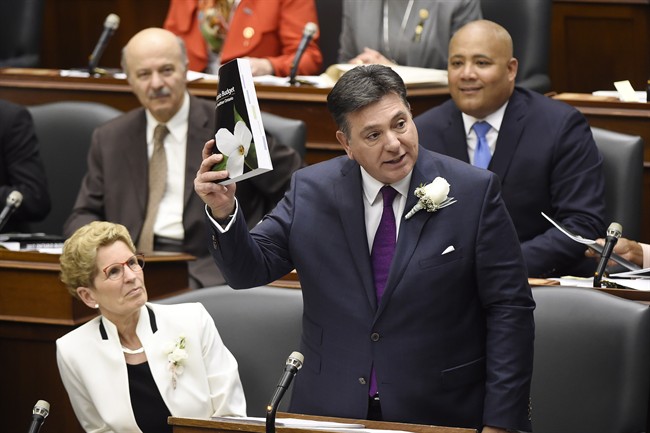The Ontario Liberal government is increasing funding for a wide range of pocketbook issues in its first balanced budget in close to a decade, as Premier Kathleen Wynne attempts to entice voters ahead of an upcoming provincial election.

Universal prescription drug coverage for youth, transit tax credits for seniors and additional funding for unpaid caregivers who assist family and friends are some of the spending measures being undertaken to appeal to voters ahead of the fast approaching June 7, 2018 vote.
As of Jan. 1, 2018, the province will launch the OHIP+: Children and Youth Pharmacare program, which will provide universal drug coverage to anyone 24 and under at an estimated cost of $465 million per year.
“Let me be clear: Our children will now receive free medication,” Finance Minister Charles Sousa said during a press conference Thursday.
“There will be no deductible, there will be no co-payment.”
The plan, which is the first of its kind in Canada, will cover the cost of all 4,400 prescription medications currently under the Ontario Drug Benefit (ODB) program regardless of family income – meaning even high income families will benefit.
“Of course everyone wants greater drug coverage,” Progressive Conservative Leader Patrick Brown said.
“But I want to make sure that those precious taxpayer dollars are going to the people that really need it.”
- Iran fires air defences at military base after suspected Israeli drone attack
- Carbon rebate labelling in bank deposits fuelling confusion, minister says
- Conservatives ask interference inquiry judge to rule elections were flawed
- Joly says Canada is monitoring escalating Iran-Israel tensions ‘closely’
READ MORE: Panel calls on Ottawa to provide universal pharmacare plan for Canadians
OHIP+ will include coverage for a wide range of essential medications such as antibiotics, asthma inhalers, cancer medications, insulin, anti-depressants and birth control for example.
“We’re trying to provide women with choice and with a safe choice,” Sousa said, in response to questions he was trying to bait the political right on the issue.
Currently more than 3.9 million people in Ontario fall under ODB coverage, including 2.3 million seniors and 900,000 on social assistance.
“If I’m a young person maybe this will impact me but it won’t impact my parents,” Ontario NDP Leader Andrea Horwath said.
“This is a very meager measure that falls short, very short of what the people of Ontario need and deserve.”
Horwath recently announced a universal pharmacare program for Ontarians of all ages, which covered a total of 125 medications, something she described as the “missing half” of the health care system.
“With this budget the premier is choosing to look away,” Horwath said, classifying OHIP+ as a “back of the napkin” plan.
“She’s closing her eyes to what everyday families need, what patients need, what young people need.”
READ MORE: Ontario NDP says $475M pharmacare plan could cover 125 drugs across the province
The budget also includes measures to lower the cost of transit for seniors with a refundable benefit of 15 per cent of eligible public transit costs – for an average annual savings of $130 as of July 1.
The province is also proposing granting municipalities across the province the ability to levy a hotel tax, something Toronto has requested of the premier, but it will be up to the individual municipalities to determine how it will be implemented.
It is unclear whether the tax would extend to home-sharing business Airbnb.
READ MORE: Toronto’s executive committee endorses road tolls, other new tax proposals
An Airbnb tax could affect families in Toronto and elsewhere in the province who rent out their property to help pay for high housing costs.
Previously announced programs include an initiative to create 40,000 job training placements and internships over three years for students of all ages and recent graduates as part of a $190-million Career Kick-Start Strategy.
The province also removed the $30 fee for the Drive Clean Emission Test, the mandatory vehicle emissions inspections and maintenance program, which tests more than two million vehicles a year.
READ MORE: $30 Drive Clean fee may be dead but nearly all other Ontario government fees increasing
But despite balancing the budget this year, the province still faces a debt of more than $300 billion, with interest on that debt generating an estimated $11.4 billion of interest.
“The first step to managing debt is coming to balance,” Sousa said. “We’re balancing our books – we’re balancing this year, we’re balancing next year and we’re balancing the year after that.”
But Brown accused the Liberals of “cooking the books” ahead of the election, adding the debt does nothing more than “erode the services that Ontario families depend on.”
READ MORE: Ontario Liberal government to announce new spending in first balanced budget in a decade
“Let’s be clear, this is not a balanced budget. They are in fact running an artificial deficit worth more than $5 billion. They are using every trick in the book to achieve this,” Brown said.
“If they lose this next election, this is spending they will never have to be accountable for.”




Comments